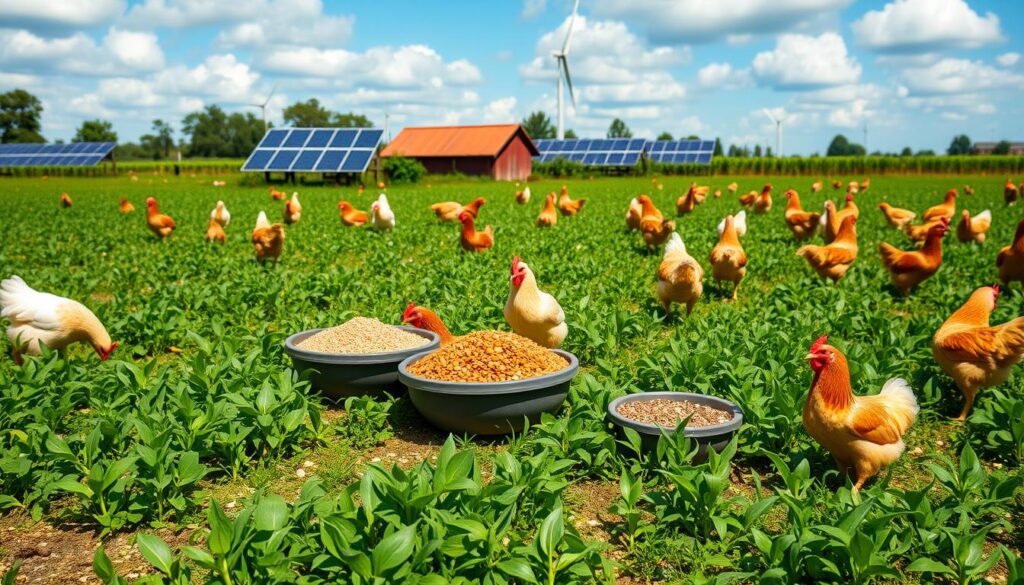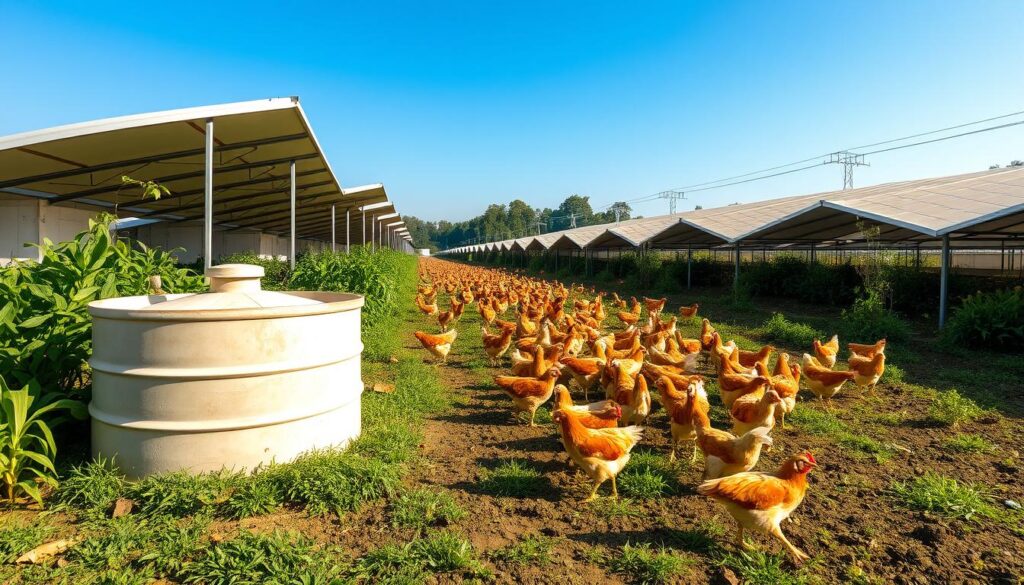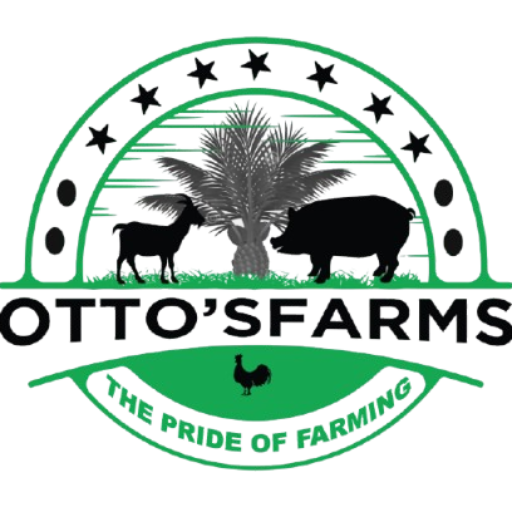Poultry, including broiler chickens, are key to sustainable food and agriculture. Broiler chickens are great at turning feed into meat. When raised with nature in mind, they help cycle nutrients, boosting biodiversity. Sustainable broiler farming cuts down the ecological footprint of poultry by composting waste and using rotation grazing. It also lowers costs and can get better prices for organic poultry.
At the core of sustainable farming is the chickens’ well-being. Practices like open space, natural diets, and health care make broilers happier and healthier. By adopting eco-friendly practices in broiler chicken farming, producers can lessen environmental harm, improve finances, and care for their animals better.
Key Takeaways
- Sustainable broiler farming reduces waste, conserves water, and improves soil health.
- Consumer demand for ethically raised, sustainable poultry is on the rise.
- Heritage breeds are often recommended for sustainable farming due to their adaptability and lower environmental impact.
- Sustainable broiler farming can reduce costs and attract premium pricing for ethically raised poultry.
- Technology, such as automated feeders and solar power, can increase efficiency and sustainability in chicken farming.
The Importance of Sustainable Broiler Chicken Farming
The broiler chicken industry is key in meeting the world’s growing need for poultry meat. Yet, traditional farming methods harm the environment. Sustainable farming offers a way forward, benefiting the planet, economy, and animal welfare.
Environmental Benefits
Sustainable broiler farming cuts down on environmental harm. It uses composting and rotation grazing to improve soil health and cut down on chemical use. This leads to a better ecosystem.
The industry has made big strides in sustainability. It now uses 75% less resources to produce the same amount of chicken as in 1965. This is thanks to new tech and better animal care.
Economic Advantages
Sustainable farming is good for the wallet too. It lowers costs like feed and water bills. Plus, organic and sustainably raised chickens can sell for more, making farmers more money.
Small-scale organic farming is especially profitable. It can bring in 200% return on investment in just three batches a year.
Animal Welfare
Animal welfare is central to sustainable broiler farming. It focuses on giving chickens more space, natural food, and health care. This makes them happier and healthier.
This approach meets consumer demand for ethical farming. It also improves the quality and safety of the chicken.
By adopting sustainable practices, farmers can greatly reduce environmental harm. They ensure their farms are economically sound and treat animals with respect.
“Sustainable broiler farming significantly reduces the ecological footprint of poultry production.”
Planning Your Sustainable Broiler Chicken Coop
Building an energy-efficient broiler house or a passive solar coop is key for green broiler chicken farming. Using passive solar design and good ventilation cuts down energy needs. This makes your coop more eco-friendly. Adding solar panels can power your coop with clean energy.
Location & Design
The spot and design of your coop matter a lot. Make sure it faces the right way for sun heating and cooling. Add big windows, overhanging roofs, and vents for air. This keeps your broilers comfy without needing extra heat or cool.
Energy Efficiency
Being energy-smart is vital for green broiler chicken farming. Use insulation, weatherproofing, and efficient lights and gear. Solar panels can also help power your coop with green energy.
Natural Predators Management
Keeping predators away is important for your broilers’ safety. Use strong fences, guardian animals, and perches to keep them safe. This way, you protect your birds without harming the environment.
| Sustainable Broiler Farming Practices | Key Benefits |
|---|---|
| Passive solar design and natural ventilation | Reduced energy consumption and improved broiler comfort |
| Renewable energy sources (e.g., solar panels) | Sustainable power supply for broiler coops and farms |
| Natural predator management (e.g., fencing, guardian animals) | Protecting broilers without harmful chemicals or practices |
Plan your coop’s location, design, and energy use wisely. Also, manage predators naturally. This way, you’ll have a green and safe broiler farm that’s good for the planet and your birds.
Selecting the Right Broiler Chicken Breeds
Choosing the right broiler chicken breed is key for sustainable farming. Heritage breeds are known for their hardiness and adaptability. They are often a better choice than high-production hybrids. It’s important to pick a breed that fits your farm’s climate and conditions well.
Heritage vs. Hybrid Broiler Breeds
Heritage breeds like the Cornish, Big Red, and Bresse grow slower but are more resilient. On the other hand, hybrids like the Cornish Cross and Kosher King grow faster, reaching market weight in 5-8 weeks. However, they need more care to stay healthy.
When picking breeds for sustainability, consider the balance between growth rate and adaptability. Heritage breeds may take longer to grow, but they need less care. This makes them a greener choice over time.
Adaptability to Environment
It’s also crucial to think about how well the chickens will adapt to your local climate and terrain. Some breeds, like the Turkens and Dokki 4, do well in warm weather. Others, like the Dark Cornish and Jersey Giants, prefer cooler climates. Choosing a breed that fits your farm’s environment is key to its success and sustainability.
“Selecting the right broiler breed is fundamental to the success of sustainable farming. Heritage breeds, known for their resilience and adaptability, can often be a more sustainable choice than high-production hybrids.”
Feeding Broilers Sustainably
Sustainable broiler farming focuses on caring for the environment, animals, and making money. Choosing the right broiler feed is key. Using organic broiler feed from nearby farms helps the planet. It also cuts down on the need to transport feed long distances.
Adding kitchen scraps to broiler food is smart and green. It cuts down on food waste. Plus, it helps the farm by turning the broilers’ waste into nutrient-rich soil.
| Sustainable Broiler Feed Alternatives | Benefits |
|---|---|
| Organic broiler feed | Supports local, sustainable agriculture and reduces carbon footprint |
| Kitchen scraps | Reduces food waste and enables on-farm nutrient cycling |
| On-farm feed production | Increases self-sufficiency and reduces reliance on external inputs |
For those wanting to go further, making feed on the farm is an option. Growing and processing feed on-site boosts self-sufficiency. It also cuts down on the need for outside help, making the farm more sustainable.

By using organic feed, kitchen scraps, and making feed on the farm, broiler farming gets greener. This approach helps the planet, the animals, and keeps the farm running well for years to come.
How to Implement Eco-Friendly Practices in Broiler Chicken Farming
Starting eco-friendly broiler chicken farming means caring for animals and the environment. It’s about using sustainable methods in every part of farming. This includes designing coops, using energy wisely, managing predators, and handling waste.
To make broiler farming sustainable, farmers need to focus on a few key areas:
- Coop Design and Energy Efficiency: Making the coop better for birds and saving energy is crucial. Adding solar panels can make the farm even greener.
- Natural Predator Management: Using animals or habitat changes to keep predators away is better than chemicals. It’s safer for birds and the environment.
- Sustainable Feeding: Choosing local, sustainable feed and using less soy and corn is better. Adding new protein sources helps too.
- Waste Management: Handling manure well and using it for crops makes farming more eco-friendly. It’s a closed-loop system.
| Sustainable Practice | Environmental Benefits | Economic Advantages | Animal Welfare Improvements |
|---|---|---|---|
| Reduced inorganic trace mineral supplementation | Decreased fecal excretion of Zn, Mn and Cu by 33%, 49%, and 65% respectively | Improved feed conversion rate by up to 2.7 points | Decreased incidence of mild footpad dermatitis by 71% and increased normal footpad by 7% |
| Balanced breeding approach | 16% reduction in energy use, attributed to improved live weight and production efficiencies | Heightened sustainability and bird welfare levels | Preserved the planet for future generations |
By using these eco-friendly broiler farming methods, farmers can lessen their environmental footprint. They can also improve animal care and make their farms sustainable for the future.
“Advancements in technology and sustainable practices are transforming poultry farming into an environmentally friendly industry.”
Water Management in Broiler Chicken Farming
Effective water management is key in sustainable broiler chicken farming. It includes harvesting rainwater and using water-saving techniques. These strategies help reduce water use and ensure your flock has enough water.
Rainwater Harvesting
Collecting and using rainwater is a smart way to save water in broiler operations. Rainwater harvesting systems can be simple or complex, depending on your coop design. This method cuts down on the need for municipal or well water, saving money and being better for the environment.
Water Conservation Techniques
Using water-saving techniques alongside rainwater harvesting boosts your farm’s sustainability. Methods like drip irrigation and ensuring clean water for your broilers reduce water waste. This makes water use more efficient.
- Drip irrigation: This method delivers water directly to the roots of your broilers, reducing evaporation and runoff compared to traditional sprinkler systems.
- Clean, accessible water sources: Keeping your broilers’ water sources clean and easily accessible can encourage them to drink more, reducing the overall water consumption of your flock.
By adopting these water management practices, broiler farmers can make their operations more water-efficient. This helps make the industry more sustainable.

“Water conservation is not just a buzzword in the broiler industry – it’s a necessity. Implementing sustainable water management practices can have a profound impact on the environmental and economic viability of your farm.”
Implementing a Rotation Grazing System for Broilers
Broiler rotation grazing systems are great for the soil and the chickens. They help improve soil health and give chickens a rich diet. This also cuts down on the need for extra feed.
Benefits for Soil and Broilers
Rotating broilers through different areas improves the soil. The chickens’ hooves and manure act as natural fertilizers. This movement also stops overgrazing and damage to the soil.
For the chickens, this system means a varied, nutritious diet. They get to eat fresh grasses, insects, and more. This makes them healthier and happier.
How to Set Up
Creating a broiler rotation grazing system needs planning and flexibility. Divide your land into paddocks for regular rotation. Think about paddock size, fencing, and bird numbers for a good system.
- Start with 100-foot grazing strips for 180 broilers in a 3-day rotation.
- Use mobile “coops” or shelters for easy movement to new areas. This gives chickens fresh ground and space.
- Try adding other animals like ruminants or pigs. They help improve soil health and nutrient cycling.
With a well-planned broiler rotation grazing system, farmers can enjoy better soil, healthier chickens, and a greener operation.
The Role of Technology in Sustainable Broiler Farming
Technology is key in making broiler farming more sustainable. It brings in automated feeding and watering systems and solar power. These modern tools help farms work better and harm the environment less.
Automated Feeders and Waterers
Automation is vital for sustainable broiler farming. It keeps broilers fed and watered all the time. This cuts down on waste and boosts farm efficiency.
These systems use sensors to give just the right amount of food and water. This saves resources and makes sure broilers get what they need.
Solar Power Solutions
Using solar power is a big step towards green broiler farming. Solar panels on farms provide clean energy. This lowers the farm’s carbon footprint and saves money in the long run.
FAQ
What are the environmental benefits of sustainable broiler chicken farming?
Sustainable broiler farming cuts down on the harm to our planet. It uses composting and rotation grazing to make the soil better. This means less need for harmful chemicals, helping our ecosystem stay healthy.
How can sustainable broiler farming be economically advantageous?
Sustainable farming can save money on things like feed and water. It also can get better prices for the chicken. This makes the farm more stable over time.
How does animal welfare play a role in sustainable broiler farming?
Animal welfare is key in sustainable farming. It focuses on giving chickens more space, natural food, and health care. This makes their lives better and healthier.
How can the design and placement of a broiler chicken coop affect sustainability?
A well-designed coop uses the sun and air well. This cuts down on energy use and keeps chickens healthy. Adding solar panels can power the coop without harming the environment.
What are the advantages of choosing the right broiler breed for sustainable farming?
Choosing heritage breeds is often better for the planet. They are strong and can adapt well. This means less need for extra care, keeping the flock healthier.
How can sustainable feeding practices benefit broiler chicken farming?
Using organic feed from nearby farms is good for the planet. It also cuts down on the need for long-distance transport. Adding kitchen scraps and composting waste makes the farm cycle complete.
What are some key strategies for implementing eco-friendly practices in broiler chicken farming?
Every part of the farm needs to be sustainable. This includes the coop, energy use, and how you manage predators and waste. It’s all about making the farm eco-friendly.
How can water conservation be achieved in broiler chicken farming?
Using rainwater for the chickens is a great way to save water. Make sure they have clean water always. These steps help manage water better.
What are the benefits of implementing a rotation grazing system for broilers?
Rotation grazing makes the soil better and gives chickens a natural diet. This means less need for extra food. It’s a smart way to keep the land healthy and the chickens fed.
How can technology contribute to sustainable broiler farming?
Technology, like automation, can cut waste and keep chickens fed and watered. Solar power is also a big help, reducing the farm’s carbon footprint. It’s a smart investment for a sustainable farm.

